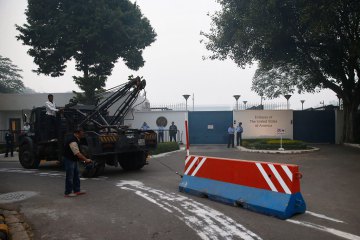Indian officials call the arrest and treatment of their deputy-consul in New York "barbaric" and have meted out retaliatory measures on U.S. diplomats based in India
 |
| Saurabh Das / AP Indian workers remove a barricade that had been erected as a safety measure outside the main entrance of U.S embassy, reportedly in retaliation to the alleged mistreatment of New York based Indian diplomat Devyani Khobragade, in New Delhi, Dec. 17, 2013. |
Dec. 17, 2013: The arrest and treatment in custody of an Indian diplomat in New York City has caused an uproar in India, and a week after the incident, there are signs of an all-out diplomatic row with the U.S.
The fracas began on on Dec. 12 when Devyani Khobragade, India’s deputy consul-general in New York, was arrested while she dropped her daughter off at school. According to Khobragade’s attorney, she was publicly handcuffed, strip searched, kept in a cell with drug addicts, and finally released on $250,000 bail. Khobragade is accused of submitting false documents on an application for her housekeeper to live and work in the U.S. and not paying the housekeeper a minimum wage.
Khobragade’s treatment while in custody, particularly the report that she was strip searched, has caused an uproar in India. As a consular official, under the U.N.’s 1963 Vienna Convention on Consular Relations, Khobragade does have limited diplomatic immunity for work in the official line of duty. Under those guidelines, consular officials can still be arrested or detained for a felony. If American prosecutors pursue a full case, they will likely argue that the charges against Khobragade–one count of visa fraud and one count of making false statements, are not related to her official duties. The charges carry a maximum sentence of ten years and five years, respectively, and Khobragade’s attorney has said she plans to challenge the arrest on the grounds of diplomatic immunity.
Many in India object to the idea that Khobragade was treated like a “common criminal” when she was arrested and booked. “As a father I feel hurt, our entire family is traumatized,” Uttam Khobragade told the TimesNow TV news channel. National Security Adviser Shivshankar Menon called her treatment “despicable and barbaric.” The official statement from the Indian government said it was “shocked and appalled at the manner in which the diplomat had been humiliated.”
But the fallout did not end with expressions of umbrage. Bulldozers removed security barriers outside of the U.S. Embassy in New Delhi, and U.S. diplomats and their families are being stripped of ID cards that make clearances easier. “We will deal with them exactly the same way they are dealing with us. Not anything more, not anything less,” Ravi Shankar Prasad, leader of the opposition Bharatiya Janata Party, told reporters. “While the U.S. doesn’t provide many courtesies to our diplomats, we go out of the way not to withhold those facilities.”
Political leaders from both the ruling and opposition parties refused to meet with an American Congressional delegation visiting Delhi this week; Narendra Modi, the BJP’s candidate for prime minister, explained his snub on Twitter, saying he “refused to meet the visiting USA delegation in solidarity with our nation, protesting ill-treatment meted to our lady diplomat in USA.”
Khobragade’s arrest is certainly not the first time American legal procedures have sparked outrage in the hope country of a prominent international figure. In May 2011, when then International Monetary Fund chief Dominique Strauss-Kahn was arrested in New York on charges of sexually assaulting a hotel maid, he was marched into the police precinct in handcuffs before an assembled bank of photographers. The so called “perp walk,” which is standard fare in the U.S., caused outrage in Strauss-Kahn’s native France. Indeed, two years after the charges against him were dropped and he returned to France, Strauss-Kahn said he was still angry at his treatment while in custody. It also stands in stark contrast to the measures the U.S. itself often uses when its diplomats and government employees run afoul of the law overseas.
In Washington, a State Department spokeswoman said that the diplomatic security team that arrested Khobragade followed standard procedures and turned her over to the U.S. Marshals for processing. If the Strauss-Kahn incident is any indication, Khobragade isn’t likely to get any apologies from local authorities. The American process of law and order has sparked outrage before; the only question in this case is how long this diplomatic row will continue between two countries that have an important relationship.
